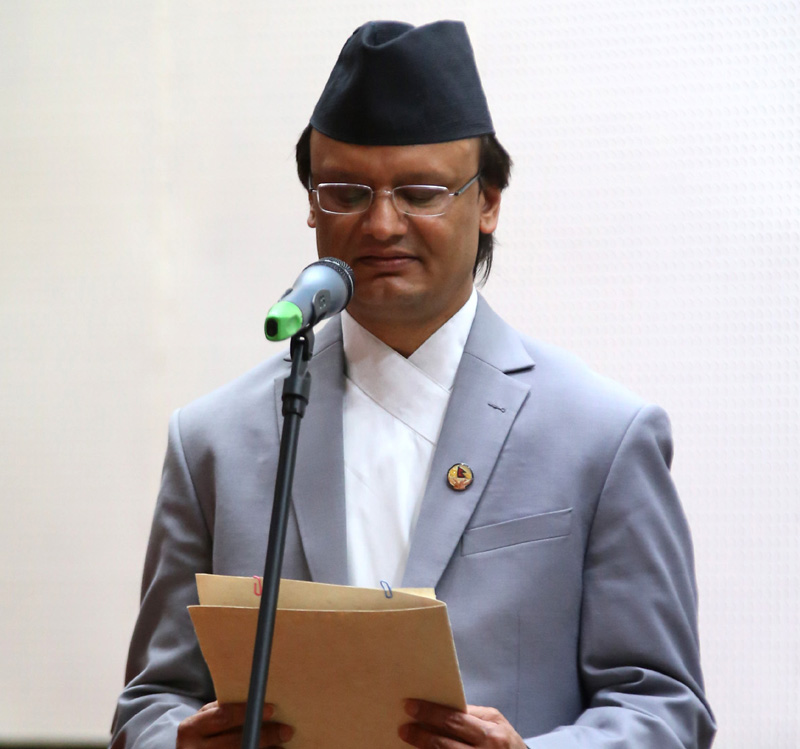Minister Chand bats for export-led growth
Kathmandu, May 16
Newly appointed Commerce Minister Jayanta Chand has laid emphasis on productive capacity enhancement in the country to address the burgeoning trade deficit. Citing the current situation of huge gap in export and import, which is nearly 1:9.4 (based on seven months’ data of this fiscal), the minister said that his ministry will keep focus on addressing supply-side constraints and trade-related infrastructure development in the coming days.
Unveiling a 60-day action matrix for the implementation of policies and programmes of fiscal 2015-16 under his ministry today, Minister Chand said, “Time-bound implementation of the policies and programmes will be prioritised to move forward to achieve longer term objective of export-led growth.”
The country sorely lacks products and services to boost export. “First we have to develop products and services to promote exports,” said the minister, adding, “We have to focus on niche market products to reap the benefits from export.”
There is widely shared perception that Nepal’s accession in World Trade Organisation (WTO) in 2004 resulted in de-industrialisation as the domestic industries failed to compete with cheaper imported products. However, the commerce minister said, “Accession in multilateral trade regime has generated both opportunities and challenges, and the country has to utilise the situation in its favour.”
The country suffering from supply-side constraints is mainly due to deteriorated business environment like insurgency, political instability, power-cut, labour unrest, as per him.
“Now we have to focus on improving investment climate by addressing all the impediments of investment and bring fresh investment — both foreign and domestic — to enhance production.”
On the other hand, as per the minister, development of trade-related infrastructure, wider road connectivity, Inland Clearance Depots, well-facilitated customs houses will lure private sector to increase investment in the country.
He also stressed on institutional capacity enhancement and human resource development to be more competitive. Even as logistics costs of trade is considered to be high in the country, Minister Chand said that reforms in labour sector, generation of cheaper hydroelectricity, reforms in tax laws could lead the country towards earning the label of ‘low-cost producer’, and in that stage various goods and services will be able to compete in the global market.
Also speaking in the programme, Commerce Secretary Naindra Prasad Upadhyay said that the country has no alternative other than to enhance productive capacity to attain sustainable and inclusive economic growth. He stressed on the productive employment generation so that production can be triggered. He also sought the inter-ministerial coordination for the implementation of Trade Policy, 2015 — the blueprints of Ministry of Commerce — and Nepal Trade Integration Strategy. The collective effort from the government, private sector and other stakeholders is a must to deliver better results, as per Upadhyay.
The ministry aims to accomplish various works within this fiscal. The ministry will start the process of developing critical infrastructure. Expression of interest (EoI) will be sought to develop Inland Clearance Depot in Dodhara-Chadani in far-western part of Nepal. Likewise, it will expedite the land acquisition process of ICD Rasuwagadhi, consultant hiring of Container Freight Station in Chobhar, and develop cold storage facility in ICDs of Birgunj and Kakadvitta.
Upgradation of ICD Bhairahawa, completion of ICD in Larcha of Tatopani are expected to be concluded by this fiscal. Along with this, the ministry will correspond with its Indian counterpart to conclude the process already initiated for the movement of bulk-cargoes from the rail-heads of Nautanawa to Bhairahawa and Jogbani to Biratnagar through exchange of letters. Likewise, review in the Railway Service Agreement with India will be proposed to make the pact more contextual.
Similarly, trademark registration of Nepali carpets in the US and Europe and cardamom in India, United Arab Emirates and Pakistan has been planned for conclusion within this fiscal. The ministry has also targeted to develop the protocol for transit agreement between Nepal and China, which was signed during PM KP Oli’s visit to China in March.
Besides, various bi-lateral meetings, participation in trade fairs, study reports and policies planned for this fiscal have been incorporated in the action matrix.






